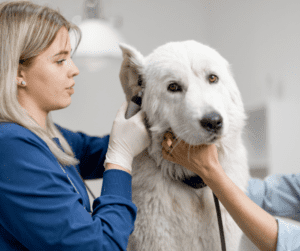Some dogs, like some children are especially prone to those annoying, smelly ear infections. There can be many reasons for this. Let’s know the exact cause of ear infections in dogs first.
Table of Contents
Many Causes
Food allergy is the number one cause of ear infection in dogs.
The ear naturally secretes a fluid called cerumen. Inflammation due to allergy or other cause results in excessive secretions, which creates the perfect environment for bacteria to thrive. This results in the telltale odor.
Ear mites or scabies can also cause inflammation in the ear. Ear mites can usually be recognized by what looks like dirt in the ear.
Foreign bodies are another potential cause of inflammation and infection. The dog is usually very uncomfortable and will frequently shake his head or paw at the ear.
If the offending object cannot be seen, take the dog to the vet for removal.
A mechanism within the ear known as keratinization moves skin cells from the inner ear to the outside. Some disorders interfere with this process, changing the composition of the secretions and disrupting the integrity of the skin.
Swimming can sometimes lead to infection if the ear does not dry out. A few drops of alcohol in the ear canal after swimming will help evaporate the water.
Over treatment of past infections can perpetuate the problem. Use of cotton swabs, overuse of ear cleaners or medications can irritate the skin, causing swelling and folding of the tissues.
Repeated use of antibiotics can lead to resistant strains of bacteria. Overuse of corticosteroids can also exacerbate the problem.
If antibiotics are required, it is best to get a culture in order to choose a specific one rather than resort to broad-spectrum drugs.
Even when medications are properly used, some dogs are actually sensitive to them and can have an adverse reaction.
Less common causes of ear infection would include growth in the ear canal and certain skin disorders. Other factors causing over-production of cerumen are hormonal disorders such as hyperthyroidism.
Dog Breeds Prone to Infection
Some breeds have a genetic predisposition to ear infections. Shar-peis, for example have extremely narrow and folded ear canals. This causes an overly moist environment and allows a build-up of bacteria.
Labs and some spaniels have a large number of ceruminous glands, resulting in excessive secretions.
Dogs with excessive hair in the ear can also be subject to frequent infections.
Ear Infection in dogs can be Serious
Constant inflammation of the external parts of the ear can eventually effect the middle and inner ear areas resulting in more serious problems.
Stenosis of the ear is a narrowing of the ear canal, most often caused by chronic inflammation.
Ear infection is almost always a chronic problem unless the underlying cause can be found and cured.
Prevention is the Key
In many cases, prevention is the only way to manage ear infections in dogs.
Keep the ear canal clean and dry – but don’t over-do it. Irrigating with a cleaning solution once a week is adequate for long, floppy-eared dogs, but once a month is probably all dogs that with erect ears need.
A vinegar solution can be used to clean the ears in order to keep the environment acidic. All you need is about three drops of vinegar to one ounce of water.
Herbal solutions can provide anti-microbial, anti-inflammatory or healing actions.
Gently dry the ear after treatment.
Homeopathy may be able to correct an imbalance within the body that is causing the chronic problem.
You may also like to read: Flea and Tick Control for Dogs, How to get rid of fleas, Give Your Dog a Bath!
If you are a dog lover then, Subscribe to our weekly newsletters. No Spams!








